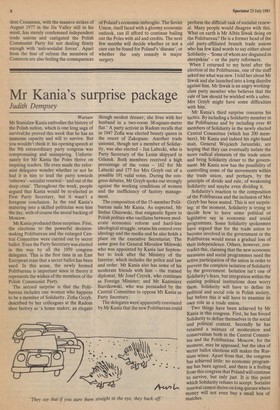Mr Kania's surprise package
Judith Dempsey
Warsaw Mr Stanislaw Kania embodies the history of the Polish nation, which is one long saga of survival;he proved this week that he has an immense capacity and will to survive. But you wouldn't think it: his opening speech at the 9th extraordinary party congress was compromising and uninspiring. Unfortunately for Mr Kania the Poles thrive on inspiring leaders. He even made the reformist delegates wonder whether or not he had it in him to lead the party towards 'odnowa'— socialist renewal — 'and out of the deep crisis'. Throughout the week, people argued that Kania would be re-elected as First Party Secretary, but it wasn't a foregone conclusion. In the end Kania's maturing into a skilled politician won him the day, with of course the moral backing of Moscow.
Mr Kania produced three surprises. First, the elections to the powerful decisionmaking Politbureau and the enlarged Central Committee were carried out by secret ballot. Even the Party Secretary was elected in this way by all the 1959 congress delegates. This is the first time in an East European state that a secret ballot has been used. In this sense, the newly formed Politbureau is important since in theory it represents the wishes of the members of the Polish Communist Party.
The second surprise is that the Patbureau includes one woman who happens to be a member of Solidarity, Zofia Grzyb, described by her colleagues at the Radom shoe factory as 'a home maker, an elegant though modest dresser; she lives with her husband in a two-room 38-square-metre flat.' A party activist in Radom recalls that in 1947 Zofia was elected beauty queen in the resort of Zakopane. Another trade unionist, though not a member of Solidarity, was also elected — Jan Labecki, who is Party Secretary of the Lenin shipyard in Gdansk. Both members received a high percentage of the votes — 162 for Mr Labecki and 177 for Mrs Grzyb out of a possible 191 valid votes. During the congress debates, Mr Grzyb spoke out strongly against the working conditions of women and the inefficiency of factory management.
The composition of the 15-member Politbureau suits Mr Kania. As expected, Mr Stefan Olszowski, that enigmatic figure in Polish politics who vacillates between moderate economic reform and hard-line ideological struggle, retains his control over ideology and the media and he also holds a place on the executive Secretariat. The same goes for General Miroslaw Milewski who was appointed by Kania last September to look after the Ministry of the Interior, which includes the police and law and order. Mr Kania also has some of his moderate friends with him — the trained diplomat, Mr Josef Czyrek , who continues as Foreign Minister; and Mr Kazimierz Barcikowski, who was persuaded by the Central Committee to oppose Mr Kania as Party Secretary.
The delegates were apparently convinced by Mr Kania that the new Politbureau could perform the difficult task of socialist renewal. Many people would disagree with this. What on earth is Mr Albin Siwak doing on the Politbureau? He is a former head of the old party-affiliated branch trade unions who has few kind words to say either about Solidarity — 'Some of whom are disguised in sheepskins' — or the party reformers.
When I returned to my hotel after the election of the Politbureau, one of the staff asked me what was new. I told her about Mr Siwak and she launched into a long diatribe against him. Mr Siwak is an angry workingclass party member who believes that the rule of law should be wielded with a sabre. Mrs Grzyb might have some difficulties with him.
Mr Kania's third surprise concerns his tactics. By including a Solidarity member in the Politbureau and by including over 40 members of Solidarity in the newly elected Central Committee (which has 200 members), Mr Kania and indeed his right-hand man, General Wojciech Jaruzelski, are hoping that they can eventually isolate the more radical elements of the trade union and bring Solidarity closer to the government. Mr Kania now has the possibility of controlling some of the movements within the trade union, and perhaps, by the principle of divide and rule, of weakening Solidarity and maybe even dividing it.
Solidarity's reaction to the composition of the Politbureau and the inclusion of Mrs Grzyb has been muted. This is not surprising: at the moment, Solidarity is trying to decide how to have some political or legislative say in economic and social programmes. Some Solidarity spokesmen have argued that for the trade union to become involved in the government or the Politbureau would mean a gradual loss of their independence. Others, however, contradict this, claiming that the new economic measures and social programmes need the active participation of the union in order to prevent the complete isolation of Solidarity by the government. Isolation isn't one of Solidarity's fears, but integration within the existing political institutions does worry them. Solidarity will have to define its political and social role in Polish society, but before this it will have to examine its own role as a trade union.
Two things have been achieved by Mr Kania in this congress. First, he has forced Solidarity to define themselves in the social and political context. Secondly he has retained a mixture of moderation and conservatism both in the Central Committee and the Politbureau. Moscow, for the moment, may be appeased, but the idea of secret ballot elections still makes the Russians wince. Apart from that, the congress has achieved little: no economic programme has been agreed, and there is a feeling from this congress that Poland will continue to survive, but only just. It is this point which Solidarity refuses to accept. Socialist renewal cannot thrive on long queues where money will not even buy a small box of matches.


































 Previous page
Previous page